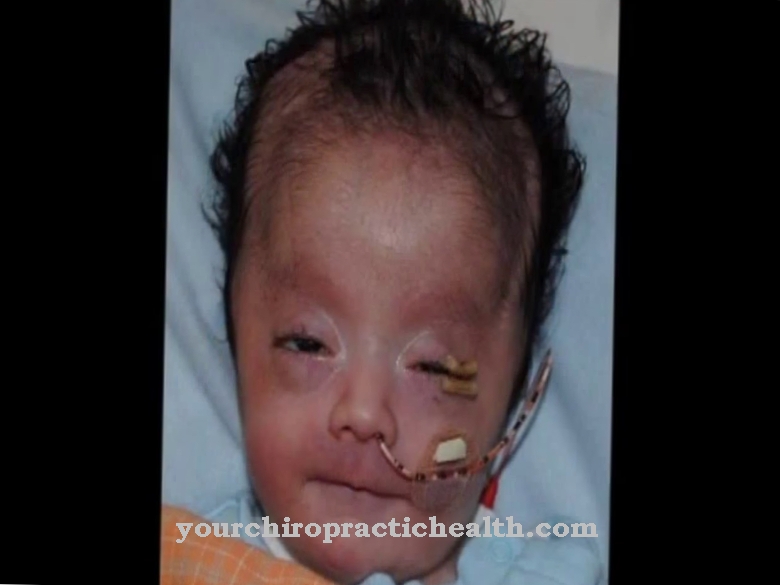A Lymphoma in the brain has a special position in brain tumors. This is because it is made up of cells that are not brain-brain. Compared to other brain tumors, brain lymphomas are relatively rare. Only three percent of brain tumors are lymphomas.
What is lymphoma in the brain?
.jpg)
© pikovit - stock.adobe.com
As Lymphoma in the brain degenerate cells of the immune system are called. More precisely, it is in the lymphocytes, which belong to the white blood cells. These form a lump.
Normally, lymphomas settle within the lymphatic organs. These include lymph nodes, liver, spleen and the mucous membranes of the stomach and intestines. However, the lymphoma can spread from these organs into the brain and become what is known as secondary brain lymphoma.
However, it is also possible that lymphoma develops in the brain itself. Such a lymphoma is called primary brain lymphoma. This lymphoma in the brain has its origin in degenerated lymphatic cells.
causes
For the Lymphoma in the brain the causes are unfortunately not yet known. The trigger for the deburring of the white blood cells and the associated formation of a lump in the human brain remains a mystery.
However, it can be said that the risk of developing lymphoma in the brain is relatively low in people with an intact immune system. In people who have a weakened immune system, however, the risk increases enormously.
It was found that about one percent of people suffering from AIDS have a lymphoma in the brain. Basically, the shorter the duration of the underlying disease, the lower the risk of developing lymphoma in the brain.
Symptoms, ailments & signs
Lymphoma in the brain can cause a variety of symptoms. These depend, among other things, on the location and size of the cerebral lymphoma. The first signs of illness are often nausea, vomiting and headaches. These symptoms are particularly noticeable with increased intracranial pressure, which occurs in almost half of those affected.
An increase in intracranial pressure occurs when the cerebral lymphoma spreads to the meninges. This often results in accumulations of fluids (brain water, liquor) in the brain water chambers. Sometimes symptoms of paralysis are observed that affect only one half of the body. This is called hemiparesis. The eyes are also often affected when certain cell components penetrate the vitreous humor and the middle skin of the eye.
Visual field deficits or reduced visual acuity then occur, which are characterized by partial weakening of the visual field and a reduction in visual acuity. Half of all patients with cerebral lymphoma develop neuropsychological symptoms such as memory disorders, personality changes and states of confusion.
Aphasia (speech disorders) can also occur. The language disorders make themselves felt, among other things, through impairments in language formation and language understanding. If the lymphoma is in the temporal lobe,]] epilepsy epileptic seizures]] can also occur. However, this is rarely the case. The prognosis of the disease ranges from complete healing to fatal courses and depends on the type, size, location and time of the start of treatment.
Diagnosis & course
_2.jpg)
For the diagnosis of one Lymphoma in the brain the modern marker making process plays an important role. It is possible to use magnetic resonance imaging and computed tomography to make the affected regions visible. However, the cross-sectional imaging method does not offer a reliable diagnosis.
The reason for this is the diversity of a lymphoma in the brain. Additional research is required. In this context, the examination of the brain water must be mentioned. However, only the histological examination provides final certainty with regard to the diagnosis.
Lymphoma in the brain requires diagnosis and treatment as quickly as possible, since the tumor usually grows very quickly. The form of therapy is very important for the course of the disease. It is therefore chosen carefully by doctors. Typically, the lymphoma in the brain responds very well to radiation therapy.
However, this alone is not enough and the therapy is associated with a great risk. For this reason, a combined version of chemotherapy and radiation therapy is recommended. In such a case, brain lymphoma has a 5-year survival rate of up to 70 percent.
Complications
Typically, brain lymphoma is a very serious symptom. If the tumor is not treated or removed, the patient will, in most cases, be killed. For this reason, treatment by a doctor is definitely necessary. The patients suffer primarily from headaches, which usually cannot be controlled with the help of pain relievers.
It is also not uncommon for vomiting or nausea to occur. Those affected can also have visual disturbances and are therefore significantly restricted in their everyday life. Lymphoma in the brain can also cause paralysis and sensitivity disorders in different parts of the body and significantly reduce the patient's quality of life.
It is not uncommon for people to become versed or have a memory gap, making everyday life much more difficult for those affected. Personality disorders or psychological complaints can also occur in the brain as a result of lymphoma. The treatment of this complaint is possible with radiation therapy and chemotherapy.
With this, the tumor can possibly be completely removed. As a rule, however, it cannot be universally predicted whether the disease will result in a completely positive course. The life expectancy of the patient may be reduced and restricted by the lymphoma in the brain.
When should you go to the doctor?
If there are signs of lymphoma in the brain, medical advice is required. If neurological deficits, cramps, recurring migraines, gastrointestinal complaints and other symptoms appear, it is best to see your family doctor immediately. Consult a neurologist if you have severe or rapidly increasing symptoms that affect your well-being. If the symptoms arise in connection with a viral infection, the ingestion of certain chemicals or X-rays or gamma radiation, the responsible doctor must also be informed.
Affected people should also seek medical advice if severe accompanying symptoms such as headache, nausea and vomiting or memory disorders occur. In the case of recurring epileptic seizures, it is best to call the emergency doctor. The actual diagnosis is made by a neurologist, who usually also initiates treatment.
Other contact points are internists and physiotherapists. Since the disease can also affect the psyche, accompanying psychotherapy is useful. After the end of the treatment, the patient must be examined regularly in order to rule out any recurrences or to be able to treat them immediately.
Treatment & Therapy
At a Lymphoma in the brain the treatment depends on the tumor. If the lymphoma is isolated, a combination of chemotherapy and radiation therapy is usually used. However, early diagnosis is the basis for successful treatment.
An additional medication is often given to prevent the lymphoma from spreading through the cerebral fluid. It is administered via a puncture in the spinal canal. The radiation for a lymphoma in the brain is carried out in single doses and takes place over a period of up to five weeks. Treatment in the form of surgery is not an option for lymphoma in the brain. This is because cerebral lymphomas cannot be completely removed in the case of lymphoma in the brain.
Outlook & forecast
If left untreated, the lymphoma in the brain leads to the premature death of the person affected. There is a steady increase in pain or dysfunction, as the lymphoma can continue to spread unhindered inside the head. Ultimately, the patient's organism is so weakened that death occurs. The prognosis improves if the diagnosis is made early and medical treatment can be initiated. The growth of the lymphoma must be curbed as quickly as possible so that there is a prospect of a cure.
Classic cancer therapy is initiated to increase the patient's chances of survival. Chemotherapy and radiation therapy are used to prevent the diseased tissue from dividing cells. The prospect of improvement is given in people who generally have a healthy immune system. It has been shown that these people are better placed to cope with the disease.
Despite the regression of the lymphoma, the symptoms can come back at any time in the course of life. In these cases, the same treatment measures are taken as for the initial illness. Here, too, the weaker the immune system, the less favorable the prospects for relief from the symptoms. People with lymphoma experience times when they are free of symptoms. However, there is no recovery.
prevention
For a Lymphoma in the brain there are no universal preventive measures. In principle, however, it is advisable to avoid chemicals and unnecessary radiation. In addition, the immune defense should be strengthened. A low-fat and varied diet, as well as a lot of sport and little alcohol are therefore the basis for reducing the risk of developing lymphoma in the brain.
Aftercare
As with all tumorous diseases, close follow-up care is initially required after treatment. The aim of this is to detect any new tumors or metastases very early on. In the case of a brain tumor, follow-up checks are therefore carried out several times a year at intervals of a few months. If no abnormalities are found, the intervals between the next inspection will increase.
Whether there are any new growths is usually checked via MRI or CT. Precisely because malignant brain tumors often have a high risk of recurrence despite initial successful treatment, it is important that those affected keep their appointments for follow-up care regularly. The prognosis for new tumors is more favorable the earlier they are discovered.
New brain tumors do not always immediately lead to symptoms that should warn the patient. Findings in need of treatment are often discovered by chance during follow-up care. However, if you notice unusual pain outside of the follow-up check-ups, this is always a reason to see the treating doctor as soon as possible. The doctor can decide whether the next follow-up appointment should be brought forward in order to be able to rule out the possibility that new tumors have formed as soon as possible.
You can do that yourself
Treatment by means of self-help is not possible for this disease. Patients with this disease are always dependent on radiation therapy or chemotherapy to combat the lymphoma in the brain. Furthermore, you should also take regular medication to avoid spreading through the cerebral fluid. Surgical treatment is not possible here.
As with other cancers, those affected depend on constant support from friends and family. This support should not take place on a physical but also on a psychological level. In the case of depression or other psychological disorders, discussions with family or other people you trust are always helpful.
The person concerned should be relieved in his everyday life, especially if he has to undergo chemotherapy. Unnecessary loads are to be avoided in any case. Children should always be informed about the possible consequences and complications of lymphoma in the brain. Furthermore, with this disease, contact with other patients can have a positive effect on the course of the disease.
























.jpg)



